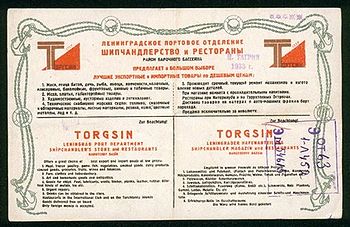
Torgsin
Encyclopedia

Hard currency
Hard currency , in economics, refers to a globally traded currency that is expected to serve as a reliable and stable store of value...
stores that operated in the USSR between 1931 and 1936. Their name was an acronym of torgovlia s inostrantsami (Russian
Russian language
Russian is a Slavic language used primarily in Russia, Belarus, Uzbekistan, Kazakhstan, Tajikistan and Kyrgyzstan. It is an unofficial but widely spoken language in Ukraine, Moldova, Latvia, Turkmenistan and Estonia and, to a lesser extent, the other countries that were once constituent republics...
: ), "trade with foreigners." Unlike the later Beryozka
Beryozka
Beriozka was a twin chain of state-run retail stores in the Russian SFSR that sold goods for hard currency. Beriozkas sold goods that were either unavailable or more expensive in regular shops...
stores, Torgsin stores were open to Soviet citizens, provided they had access to hard currency, gold or jewels. Torgsin was established by the Sovnarkom chairman Vyacheslav Molotov
Vyacheslav Molotov
Vyacheslav Mikhailovich Molotov was a Soviet politician and diplomat, an Old Bolshevik and a leading figure in the Soviet government from the 1920s, when he rose to power as a protégé of Joseph Stalin, to 1957, when he was dismissed from the Presidium of the Central Committee by Nikita Khrushchev...
's order of 5 July 1931 and disbanded 1 February 1936 http://www.pseudology.org/Documets/Torgsin.htm.
Other countries later employed similar hard-currency stores, including Intershops
Intershop
Intershop was a chain of government-run retail stores in the German Democratic Republic in which only hard currencies could be used to purchase high-quality goods. The East German mark was not accepted as payment...
in the German Democratic Republic
German Democratic Republic
The German Democratic Republic , informally called East Germany by West Germany and other countries, was a socialist state established in 1949 in the Soviet zone of occupied Germany, including East Berlin of the Allied-occupied capital city...
and Friendship Stores
Friendship store
A Friendship Store is a state-run store in People's Republic of China , which initially sold exclusively to tourists, foreigners, diplomats, and government officials but now has no restrictions on customers.-History:...
in the People's Republic of China
People's Republic of China
China , officially the People's Republic of China , is the most populous country in the world, with over 1.3 billion citizens. Located in East Asia, the country covers approximately 9.6 million square kilometres...
.
Similar stores
- BeryozkaBeryozkaBeriozka was a twin chain of state-run retail stores in the Russian SFSR that sold goods for hard currency. Beriozkas sold goods that were either unavailable or more expensive in regular shops...
- USSR - IntershopIntershopIntershop was a chain of government-run retail stores in the German Democratic Republic in which only hard currencies could be used to purchase high-quality goods. The East German mark was not accepted as payment...
– East Germany - Genex (Direct mail) – East Germany
- BaltonaBaltonaBaltona is an enterprise created in 1946 in Poland. Nationalized and subordinated to Polish communist Ministry of Foreign Trade in 1950, it was tasked with resupplying Polish ships, planes, diplomatic posts, airports, seaports, border crossings, and even scientific expeditions...
– PolandPolandPoland , officially the Republic of Poland , is a country in Central Europe bordered by Germany to the west; the Czech Republic and Slovakia to the south; Ukraine, Belarus and Lithuania to the east; and the Baltic Sea and Kaliningrad Oblast, a Russian exclave, to the north... - PewexPewexPewex was a chain of hard currency shops in communist Poland...
– PolandPolandPoland , officially the Republic of Poland , is a country in Central Europe bordered by Germany to the west; the Czech Republic and Slovakia to the south; Ukraine, Belarus and Lithuania to the east; and the Baltic Sea and Kaliningrad Oblast, a Russian exclave, to the north... - TuzexTuzexTuzex, during the period of communist rule in Czechoslovakia, was a network of shops in which it was possible to use hard currency or Tuzex vouchers to purchase foreign, mainly western luxury goods, unavailable at regular stores. The Czechoslovak koruna was not accepted. The name Tuzex is a...
– CzechoslovakiaCzechoslovakiaCzechoslovakia or Czecho-Slovakia was a sovereign state in Central Europe which existed from October 1918, when it declared its independence from the Austro-Hungarian Empire, until 1992... - CorecomCorecomCorecom was a chain of hard-currency stores during the Communist rule in Bulgaria . Goods were often priced cheaper than in the West, however, they were still inaccessible for most Bulgarians because the national currency, the lev, was not accepted at the stores...
– BulgariaBulgariaBulgaria , officially the Republic of Bulgaria , is a parliamentary democracy within a unitary constitutional republic in Southeast Europe. The country borders Romania to the north, Serbia and Macedonia to the west, Greece and Turkey to the south, as well as the Black Sea to the east... - Friendship storeFriendship storeA Friendship Store is a state-run store in People's Republic of China , which initially sold exclusively to tourists, foreigners, diplomats, and government officials but now has no restrictions on customers.-History:...
– People's Republic of ChinaPeople's Republic of ChinaChina , officially the People's Republic of China , is the most populous country in the world, with over 1.3 billion citizens. Located in East Asia, the country covers approximately 9.6 million square kilometres... - Eastern Bloc economiesEastern Bloc economiesAfter the Soviet Union's occupation of much of the Eastern Bloc during World War II, Soviet leader Joseph Stalin implemented socioeconomic transformations of each of the Eastern Bloc economies that comported with the Soviet Communist economic model...
External links
- "Sklar's Stores," Time, November 9, 1931
- Short page on Torgsin stores from website devoted to Bulgakov's Master & Margarita
- http://www.cas.sc.edu/HIST/Faculty/osokina.htmlHomepage of Prof. Elena OsokinaElena OsokinaElena Aleksandrovna Osokina is a Russian historian.-Personal:Her mother, Octobriana , named after the Bolshevik October revolution.-Education:...
of the University of South Carolina who is writing a book on Torgsins.]

